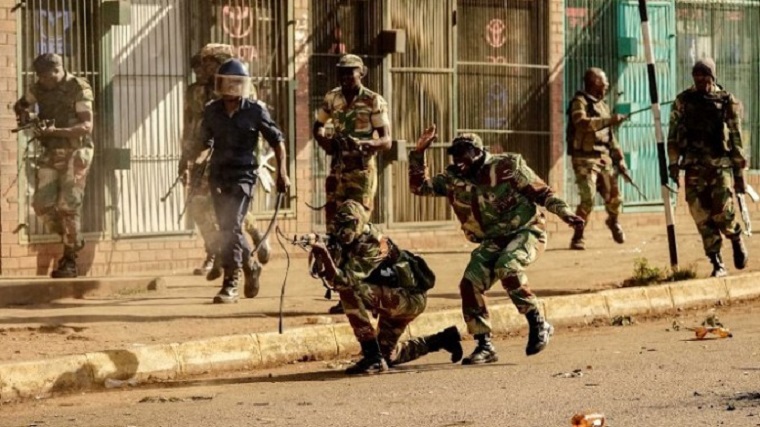 A new bill set to replace the Public Order and Security Act (Posa) gives the president of Zimbabwe, instead of the country’s defence minister, sole authority to deploy soldiers for civilian policing.
A new bill set to replace the Public Order and Security Act (Posa) gives the president of Zimbabwe, instead of the country’s defence minister, sole authority to deploy soldiers for civilian policing.
Zimbabwe’s military emerged from their barracks twice to quell public riots – in August 2018 and January 2019.
The deployment in 2018 ended with at least seven civilians dead and many more injured.
A commission of inquiry was established by President Emmerson Mnangagwa, led by former South African president Kgalema Motlanthe, to investigate the 2018 shootings and establish who was responsible for the army’s actions.
Prior to the commission undertaking its mandate, high court judge David Mangota ruled in a case brought before him in November 2018 that Mnangagwa had not deployed the army.
Instead, the blame fell on Vice-President Constantino Chiwenga, who doubled up as Defence Minister. Chiwenga has since been stripped of the defence ministry.
In its final report, the commission suggested that the provisions of Posa should be aligned to the constitution in terms of deploying the military for policing duties. With Posa on its way out, its replacement seeks to address the matter.
Clause 18 of the new Maintenance of Peace and Order Bill rectifies the constitutional defects in the previous bill by ensuring that the president, rather than the defence minister, authorises the deployment of soldiers to assist police maintaining law and order, as required by section 213 of the constitution.
The clause will also oblige the president to inform parliament within seven days of deploying the defence forces, in accordance with section 214 of the constitution.
Posa, under which public demonstrations and protests are effectively illegal, was used as part of former President Robert Mugabe’s suppression machinery, along with the Access to Information and Protection of Privacy Act (Aippa).
Lobbyists, the opposition and civil rights activists have long called for the two 2002 laws to be repealed.
However, Posa’s repeal has been a huge letdown for many. According to Veritas, a legal watchdog in Zimbabwe, the change is a copy-and-paste job.
“The provisions of Posa have been copied slavishly in the bill so that … all Posa’s undemocratic features have been retained,” said Veritas in a statement.
Under the new law, the police will still be entitled to ask political parties for lists of members or office-bearers attending committee meetings or other structures.
People will not be allowed to hold public gatherings without giving police written notice: seven days in the case of processions and demonstrations; five days in the case of public meetings.
As in section 25 of Posa, the notice would have to specify details such as “the exact and complete route” of a procession or demonstration and “the number and types of vehicles, if any” that were to take part. Anyone who fails to give notice can be found guilty of a criminal offence and imprisoned for up to a year.-TimesLive
(162 VIEWS)


